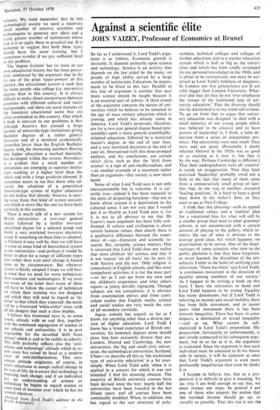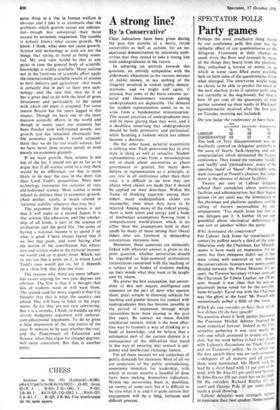Against a scientific elite
JOHN VAIZEY, Professor of Economics at Brunel So far as I understand it, Lord Todd's argu- ment is as follows. Economic growth is desirable. It depends primarily upon science and technology. Science is an activity that depends on the few aided by the many, on people of high ability served by a large number of technicians. Education, he argues, needs to be fitted to this fact. Parallel to this line of argument is another that says more science should be taught because it is an essential part of culture. A third strand of the argument concerns the nature of uni- versities which he believes to be unsuited to the age of mass tertiary education which is coming, and which has already come in America. Lord Todd's proposals, therefore, are for a two-year general degree based (pre- sumably) upon a more general scientifically- oriented education, followed by a restricted master's degree, at the end of year four, and a very restricted doctorate at the end of year six. Interspersed with this three-pronged analysis, and his conclusions, are certain obiter dicta, such as that the 'drift from science' is a sign of anti-intellectualism, and —as another example of a statement rather than an argument—that society is now more equal.
Some of what Lord Todd says is not only unexceptionable but is welcome. It is cer- tainly true—indeed it has been repeated to the point of despairing boredom—that not to know about science is a deprivation in the cultured sense. I am not sure that I would put it as bluntly as Lord Todd puts it, for it is not at all obvious to me that Dr Leavis's main argument has been fully con- fronted. If culture and civilisation is about certain humane values, then clearly there is a qualitative difference between the exper- ience of—say—literature and scientific re- search. But, certainly, science matters. One is surprised that Lord Todd does not realise that most children 'do' science, and that it is not treated 'on all fours' (as he puts it) with `history and the rest.' Only religion is compulsory in English schools, and like most compulsory activities, it is for the most part —so far as I can see from my own and my children's experience, and what others report—a pretty drivelly rigmarole. Though subjects are not compulsory, it is obvious from examination entries and from curri- culum studies that English, maths, science and social studies are very much the core of all secondary curricula.
Again, nobody has argued, so far as I know, for anything other than a diverse pat- tern of higher education. Lord Todd I know has a broad experience of British uni- versities: his honorary degrees alone should show him how extremely diverse they are. London, Oxford and Cambridge, the new universities, the big and small civic univer- sities, the technological universities, Scotland, Ulster—to describe all this as 'the traditional type of university education' is a bit over- simple. When Lord Todd adds 'when it is applied in a context for which it was not intended' I find his meaning obscure. The majority of British university courses have been devised since the war; nearly half the universities have been founded in the last fifteen years; and all courses have been continually modified. When, in addition, one has regard to the vast structure of poly-
technics, technical colleges and colleges of further education, and to a teacher-education system which is half as big as the univer• sities and which has been totally revamped (to my personal knowledge) in the 1960s, and is about to be restructured, one must be sur.
prised at Lord Todd's boldness of diagnosis,
In London our five polytechnics are (I am told) bigger than London University. What-
ever else they do they do not 'over-emphasise the virtues of the traditional type of uni- versity education.' That the diversity should not be diminished is to my mind self-evident. To go on from that to argue that univer- sity education was designed `to deal with a small minority of our young people which was believed to be creative and to have powers of leadership' is, I think, a false de- duction from a series of independent pro- mises. The universities were once small. They were and are good. (Personally I doubt whether Oxford in the 1920s was as good or as exciting as it now is, but that is by the way. Perhaps Cambridge is different.) That their undergraduates were all 'creative' is surely an exaggeration. That they later exercised 'leadership' probably owed not a little to the fact that many of them came from a comparatively small group of fam- ilies that, in one way_ or another, occupied 'leading positions'. It is hard to keep a good man down in his father's firm, as they used to say at New College.
I think that this phrasing—with its appeal to traditional values, and a 'realistic' plea for a vocational bias for what will still be a smaller group than used to enter grammar schools, is not unconnected with a certain amount of playing to the gallery, which in- volves the use of what is obvious to the average good chap, but which happens, on examination, to be untrue. One of the disad- vantages of some scientists who turn to the public platform is that they have forgotten, or never learned, the disciplines of the arts subjects. I refer to the habit of verifying your references. 'There has been,' says Lord Todd, `a continuous movement in the direction of equality among members of our society.' As I happen to be writing a book on this topic I have the references to hand and Lord Todd happens to be wrong. Equality has many dimensions, but if Lord Todd is referring to income and social mobility there has been little movement, and in recent years what movement there is has been towards inequality. There has been. in some respects, a diminution of sexual inequality —and so on. What cannot be sub- stantiated is Lord Todd's proposition. His proposition, fortunately or unfortunately, is not closely connected to his subsequent argu- ment, but in so far as it is, the argument is weakened. Since the argument is that each individual must be educated to fit his future role in society, it will be apparent at once that Lord Todd's argument is even more profoundly inegalitarian than even he thinks it is.
I happen to believe, too, that as a pro- position it is difficult to give it meaning. To see why I am bold enough to say this, we must retrace our steps. In general I am one of those who support the notion that the national income should go up, as steadily as possible. That this rise is not the same thing as a rise in human welfare is obvious and I take it as axiomatic that the problems which growth causes are substan- tial—though less substantial than those caused by economic stagnation. The trouble is nobody knows what causes growth. We know, I think, what does not cause growth. Science and technology as such are not the things that spring to mind as being essen- tial. My own view would be that at any point in time the general body of scientific knowledge is widely available. Many nations not in the forefront of scientific effort apply the internationally available results of science to their industry and agriculture—that much is certainly due in part to their own tech- nology—and the rate that they do it at has a great deal to do with the level of gross investment and particularly to the speed with which old plant is scrapped. For some reason Britain has for years lagged in this respect. Though we have one of the most massive scientific efforts in the world and though in recent years our economy has been flooded with well-trained people, our growth rate has remained obstinately low. On economic grounds I would certainly think that we do far too much science; but we have never done science purely or even mainly on economic grounds.
If we want growth, then, science is not top of the list. I would not go so far as to argue that if all science came to a stop there would be no difference; yet that is more likely to be near the case in the short run than Lord _ Todd's proposition. Most new technology represents the outcome of very old-fashioned science. Most science is more related to defence than to economic growth. (And neither, surely, is much related to 'national stability' whatever that may be.) The argument for doing science is not that it will make us a second Japan. It is that science, like education, and like scholar- ship of all kinds, is part of the essence of civilisation and the good life. The point of having a national income is to spend it on what is good. I have always feared that if we lost that point, and went haring after the notion of the contribution that educa- tion and science make to the national income, we would end up in queer street. Which, not to put too fine a point on it, is where Lord Todd's case would put us, for it depends on a close link that does not exist.
The reasons why there are more influen- tial voices arguing for two year degrees are obvious. The first is that it is thought that lots of students want or will want them. The second (and far more cogent) is that it is thought that this is what the country can afford. One will have to listen to the argu- ments. So far they are not very convincing. But it is a mistake, I think, to muddle up this strictly budgetary argument with cultural- cum-educational arguments. To do so gives a false impression of the true merits of the
case. It remains to be seen whether the UGC, and the Department of Education and
Science, when they argue for cheaper degrees, will carry conviction. But that is another story.







































 Previous page
Previous page